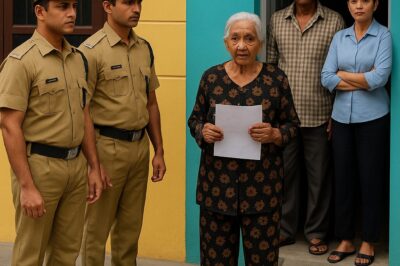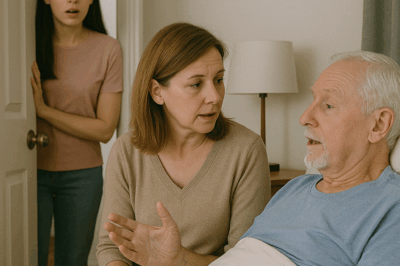On the street, a woman gave me a child and a suitcase full of money—and sixteen years later, I found out he was the heir to a billionaire.
“Take him, please!”
The woman practically shoved a worn leather suitcase into my hands and pushed the child toward me.
I almost dropped my bag of groceries—I had brought treats from the city for our village neighbors.
“What? What? I don’t even know you…”
“His name is Misha. He’s three and a half.”
The woman grabbed my sleeve; her knuckles turned white.
“Everything he needs is in the suitcase. Please don’t leave him!”
The boy clung to my leg. He looked up at me with wide brown eyes, messy blonde curls, and a scratch on his cheek.
“You can’t be serious!”
I tried to pull away, but the woman was already pushing us onto the train car.
“You can’t just do this! What about the police, child services—”
“There’s no time to explain!”
Her voice trembled with desperation.
“I don’t have a choice, do you understand? None!”
A group of dacha residents swarmed us and helped push us onto the packed train car.
I looked back—the woman was still on the platform, hands pressed to her face, tears streaming through her fingers.
“Mama!”
Misha moved toward the door, but I held him back.
The train began to move. The woman grew smaller and smaller until she vanished into the dusk.
Somehow, we found a seat. The boy curled up next to me and sniffled into my sleeve.
The suitcase pulled at my arm—it was heavy. What was in it, bricks?
“Auntie, is Mama coming?”
“She’ll come, little one. She will.”
Other passengers looked at us curiously. A young woman with a strange child and a beat-up suitcase—definitely an unusual sight.
The whole ride, I couldn’t stop thinking:
What kind of madness is this? A joke?
But what kind of joke leaves you with a real child, warm and smelling like baby shampoo and cookies?
Peter was stacking firewood in the yard. When he saw me with the child, he froze, holding a log in midair.
“Masha, where’s he from?”
“Not where, but who. Meet Misha.”
I told him everything while cooking semolina for the boy.
My husband frowned, rubbed the bridge of his nose—a clear sign he was deep in thought.
“We have to call the police. Right away.”
“Peter, what police? What am I supposed to say—someone handed me a child at the station like a puppy?”
“Then what do you suggest?”
Misha devoured the porridge, getting it all over his chin. He was starving, but tried to eat politely, holding the spoon properly. A well-mannered child.
“Let’s at least see what’s in the suitcase,” I nodded.
We sat Misha in front of the TV and put on “Well, Just You Wait!” The suitcase clicked open.
I held my breath.
Money.
Stacks and stacks of bills, bound with bank straps.
“My God,” Peter exhaled.
I grabbed a bundle at random—five-thousand ruble notes, hundreds…
I estimated there were about thirty stacks.
“Fifteen million,” I whispered.
“Peter, this is a fortune.”
We looked at each other, then at the boy laughing at the cartoon wolf chasing the rabbit.
Nikolai, Peter’s old friend, found a solution.
He came over a week later for tea and conversation.
“You can register him as an abandoned child,” he said, scratching his bald head.
“Like he was found on your doorstep. I’ve got a friend in child services who can help with the paperwork.”
Though… it’ll require some, uh, organizational expenses.
By then, Misha had settled in.
He slept in our room on Peter’s old folding bed, had oatmeal with jam for breakfast, and followed me around the house like a shadow.
He named the chickens: Speckles, Blackie, Snowy.
Only at night, sometimes, he whimpered and called for Mama.
“What if his real parents come for him?” I worried.
If they do, then so be it. But for now, he needs a roof and a warm meal.
The paperwork took three weeks.
Mikhail Petrovich Berezin—our adopted son, officially.
We told the neighbors he was our nephew from the city, orphaned in an accident.
We managed the money carefully.
First, clothes for Misha—his old things were nice but too small.
Then books, construction sets, a scooter.
Peter insisted on renovations: the roof leaked and the stove smoked.
“For the boy,” he grumbled, hammering shingles. “So he doesn’t catch cold.”
Misha grew like yeast.
By four, he knew all his letters.
By five, he could read and subtract.
Our teacher, Anna Ivanovna, exclaimed:
“You’re raising a prodigy! He should study in a special school in the city!”
But we didn’t trust the city.
What if someone recognized him?
What if that woman changed her mind and came looking?
At seven, we enrolled him in the local lyceum.
We drove him there and back—thankfully, we could afford a car.
His teachers raved:
“Your son has a photographic memory!” said the math teacher.
“And such good pronunciation!” the English teacher added. “Like a native speaker!”
At home, Misha helped Peter in the workshop.
My husband had taken up woodworking—custom furniture.
The boy could spend hours carving wooden animals.
“Dad, why do other kids have grandmas and I don’t?”
Peter and I exchanged glances.
We’d expected this question and had rehearsed the answer.
“They passed away long ago, son. Before you were born.”
He nodded seriously and never asked again.
But I could see him thinking, studying our family photos.
At fourteen, he won first place in the Regional Physics Olympiad.
At sixteen, professors from Moscow State University came to recruit him.
“A prodigy, the future of science, a Nobel Prize!” they said.
But I looked at him and still saw that frightened boy from the station.
Scared, but trusting.
I wondered—was his mother still alive? Did she think of him?
The money was nearly gone—tuition, tutors, travel.
We bought him a nice apartment in the city for college.
The rest—about three million—was saved for university expenses.
“You know,” Misha said on his eighteenth birthday,
“I love you both so much. Thank you for everything.”
We hugged tightly then.
A family is a family, even if it began in chaos.
A year later, a thick envelope arrived, no return address, filled with handwritten pages and an old photograph.
“For me?” Misha wondered, reading the label. “From who?”
He read in silence for a long time.
His expression shifted—he turned pale, then flushed.
I couldn’t help myself—I peeked over his shoulder.
Dear Misha,
If this letter has reached you, then I am no longer in this world.
Forgive me for leaving you on the platform.
I had no choice: your father died, and his business partners moved in.
They wouldn’t stop at anything—not even…
I can’t bring myself to write the threats they made.
I watched the station for a long time, choosing carefully.
That woman seemed kind—plain face, tired eyes, a wedding ring.
And she carried bags from the city, which meant she was going to the countryside—a safer place.
Your father, Mikhail Andreyevich Lebedev, owned the investment firm “Lebedev-Capital.”
After his death, I tried to hold onto the company, but his partners launched a ruthless takeover.
Lawsuits, threats.
Then they said: either I disappear, or something happens to you.
I chose your life.
I faked my death and went into hiding.
All these years, I watched from afar, hiring people to send photos and updates about your life.
You became a wonderful person.
Your adoptive parents are saints—may God bless them.
Now those people are gone; karma caught up with them.
You can now claim what’s rightfully yours:
52% of the firm’s shares, a vast sum of money.
Find lawyer Igor Semyonovich Kravtsov from “Kravtsov and Partners.”
He knows everything and is waiting for you.
Forgive me, my son.
I loved you every day, every hour we were apart.
Maybe someday you’ll understand and forgive me.
Your mother,
Elena.
I attach a photo: a young woman with a sad smile hugging a blond boy. The same one from the platform. Only younger and happier.
Misha set down the papers. His hands trembled slightly.
“I suspected it,” he said in a low voice. “I always felt something was off. But you became my family. My real parents.”
“Mishenka…” I had a lump in my throat.
“Some inheritance,” Peter whistled. “Seriously.”
Misha stood up, walked over to us, and hugged us tightly, just like he used to when he was little and storms frightened him.
“You raised me. You cared for me. You spent your final years with me. If anything comes up, we split it three ways, end of story. You’re my family. A real family.”
A month and a half later, the lawyer confirmed that Mikhail Lebedev was indeed the primary shareholder of a vast fund. The father’s former partners sued and threatened, but all their claims were dismissed.
“Mom was right,” Misha said during the celebration dinner. “In that whole station, she picked the best people. People brave enough to take in a stranger with a suitcase full of money.”
“What stranger?” Peter objected. “You’re ours!”
And we hugged again.
A strong family — not built by blood, but by love, and by the desperate act of a woman on a train platform at dusk.
“I won’t let that money be simply split in three,” interrupted the lawyer Kravtsov, adjusting his glasses. “Mikhail Andreyevich, you’re of age, but these sums… the tax authorities will take interest.”
We were sitting in his office: Peter, Misha, and I. Outside, Moscow’s streets bustled. We still couldn’t believe what was happening.
“And my parents?” Misha leaned forward. “They should get their share.”
“There are options,” said Kravtsov, pulling out a folder. “You can make them consultants for the fund with a salary. Or gradually transfer shares. Or purchase real estate in their name.”
“Let’s do it all at once,” Peter said with a sly smile. “Consultants, real estate, and shares later.”
We returned home in silence. Each lost in thought.
I wondered how our peaceful village life would change.
Peter thought about his workshop, which could now be expanded.
And Misha… he looked out the train window, as if saying goodbye to the past.
The first changes began a month later.
People in expensive suits arrived in the village, strolling the streets and taking pictures of our home.
“Journalists,” guessed our neighbor Klavdiya. “They can smell money.”
We had to hire security. Two burly men guarded our door, checking everyone who came.
The villagers mocked it at first but eventually got used to it.
“Mom, maybe we should move?” Misha suggested at dinner. “To the city, closer to the office.”
“And what about the house? The chickens, the garden?”
“We can buy a house on the outskirts. With a garden.”
Peter silently stabbed his chop.
He didn’t want to leave. His workshop was here. His clients, his friends.
“Let’s stay for now,” I said. “We’ll see later.”
But peace was no longer possible.
Journalists climbed over fences, “partners” called with offers.
And then came what we feared.
“Mikhail Andreyevich?” A woman in her fifties wearing a mink coat stood at the door. “I’m your aunt, Larisa Sergeyevna. Your father’s sister.”
Misha froze.
All these years, no one had searched for him — and now, suddenly, family.
“I have no aunts,” he said coldly.
“Come on!” The woman fumbled in her bag and pulled out yellowed photographs. “Look, this is me with your father, about twenty years ago.”
Indeed, in the photo, two young people — and the man did resemble Misha: same cheekbones, same eyes.
“What do you want?” Peter asked from behind Misha.
“What do you think?” the aunt snorted. “I’m blood! I searched for my nephew all these years. I couldn’t rest!”
“Sixteen years and no luck,” I muttered.
The woman raised her hands.
“But Elena tricked us! She said the boy was gone long ago! We believed her, we cried… Then I read the news: the Lebedev heir has appeared! My heart told me — that’s my Misha!”
Misha turned silently and went back inside.
The three of us remained.
“Leave,” Peter said firmly.
“Where were you when the boy cried at night? When he had tonsillitis in the hospital? When he went to the Olympiad?”
“I didn’t know!”
“Now you do. After the money showed up. How convenient.”
The aunt left, but returned the next day with a lawyer.
Then came other “relatives”: cousins, nephews.
All with photos. All with “proof” of kinship.
“We’re moving,” Misha decided after one more visit. “We’ll find a house in a gated community near Moscow. We can’t live here anymore.”
Surprisingly, Peter agreed.
“I’ll open a workshop there. More clients in the capital.”
The move took two months.
We found a wonderful house: three stories, a hectare of land, an hour from Moscow.
Peter immediately claimed the outbuilding for his workshop.
I picked out spots for greenhouses.
“Chickens?” I asked Misha.
“Of course, Mom. Whatever you want.”
Life in the new home was different.
Misha went to the office and handled financial matters.
Turned out he had a natural gift for investing — he increased the fund’s value by 20%.
“Genes,” Kravtsov said. “Your father was a financial genius too.”
Peter opened a furniture factory.
At first, small — around 20 employees.
Then it expanded: handmade designer furniture was in high demand.
As for me, I made the house cozy: planted a garden, a rose bed, bought ornamental chickens.
In the evenings, we’d sit on the terrace, drink tea, and talk.
“You know,” Misha said once, “I want to find my real mom’s grave. Just to put flowers there and thank her.”
“That’s right,” Peter nodded. “We must do that.”
We found the grave in a small village by a lake.
We all went together.
On the gray stone, a simple inscription:
“Elena Lebedeva. Loving Mother.”
Misha stood silently for a long time, then placed a bouquet of white roses.
“Thank you,” he whispered. “For trusting them with me.”
We flew home in silence.
The circle had closed.
The boy from the platform had become who he was meant to be — but he remained our son.
“Hey,” Misha said on the plane. “Let’s start a foundation. For orphans. So they all have a chance at family.”
“Let’s do it,” I smiled. “Call it ‘The Platform of Hope’?”
“Exactly!” Misha exclaimed. “And the first contribution — the suitcase money. What’s left, anyway?”
Peter chuckled:
“You took the whole suitcase, you fool. For the apartment.”
“Then we’ll fill a new suitcase. And not just one.”
So here we are.
A big house. A thriving business. A charity foundation.
But most importantly — we’re still a family.
The same one that began with a fateful encounter on a train platform.
Sometimes I wonder — what if I’d been afraid that day? What if I hadn’t taken Misha with me?
But my heart tells me — everything happened exactly as it should.
That woman on the platform didn’t make a mistake.
And neither did we — when we opened the door to a boy we didn’t know…
Who became the most precious person in the world.
News
Elderly Mother Sells Ancestral Land to Pay Off Son’s Debt — Three Months Later, She and Her Husband Are Thrown Out by Their Own Son and Daughter-in-Law… But They Had No Idea She’d Already Gone to the Police a Week Earlier and Had Everything Meticulously Planned/th
Elderly Mother Sells Ancestral Land to Pay Off Son’s Debt — Three Months Later, She and Her Husband Are Thrown…
Hearing How the Maid Spoke to My Father-in-Law Through the Camera, I Secretly Entered Her Room and Took Something/th
Hearing How the Maid Spoke to My Father-in-Law Through the Camera, I Secretly Entered Her Room and Took Something Ever…
The First Time My Mom Met My Boyfriend, She Clutched Her Chest and Collapsed in Tears/t
The First Time My Mom Met My Boyfriend, She Clutched Her Chest and Collapsed in Tears I never imagined my…
JUST IN! Cherry Pie Picache HlNlMATAY ng MAKITA ang LABl ni Dante Rivero!/th
Sherry Pay Pikach broke down after seeing the remains of her friend Dante Rivero. On this day, July 17, 2025,…
DANTE RIVERO’S WIFE REVEALS THE SHOCKING TRUTH BEHIND HIS DEATH! WHAT DOES THEIR CHILD HAVE TO DO WITH IT?…/TH
Wife of Dante Rivero Publicly Shares the Painful News: The Passing of a Respected Actor Shocks the Industry The wife…
Back then, my stepmother caused my parents’ divorce, but now my mother is giving her a house/th
Back then, my stepmother caused my parents’ divorce, but now my mother is giving her a house More than 20…
End of content
No more pages to load












